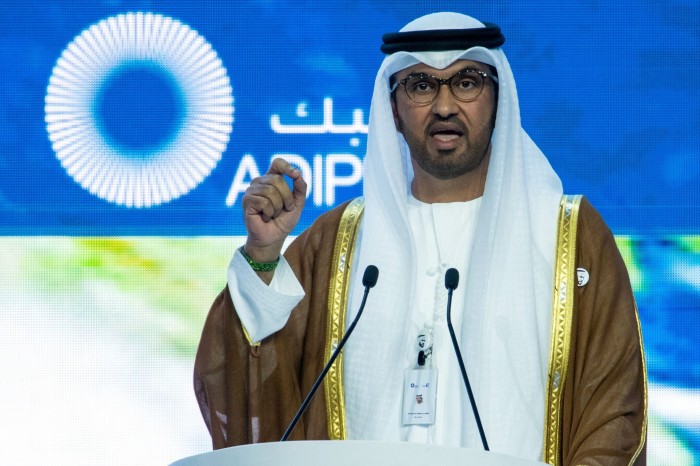As the United Arab Emirates prepares to host the COP28 climate conference, many politicians, business leaders and civic organisations say the measure of the summit’s success will come down to one issue: whether there is a global agreement to phase out all fossil fuels.
For years, the UN summit, which rotates location annually and draws in tens of thousands of delegates, including negotiators and politicians from almost 200 countries, skirted around the main cause of climate change: the burning of fossil fuels. Fossil fuels account for about three-quarters of all climate change-inducing greenhouse gas emissions.

This article is part of an FT special report into Managing Climate Change, publishing on Thursday November 30, at the start of the COP28 summit.
But circumstances changed in recent years, with countries agreeing to reduce coal usage at COP26 in Glasgow. More than 80 countries backed a proposal to stop using fossil fuels at COP27 in Egypt last year, although there was no global agreement.
Now, there is growing pressure on the UAE, one of the world’s largest oil and gas producers, to oversee negotiations that place a shift away from hydrocarbons at the heart of the COP28 outcome.
Eamon Ryan, Ireland’s environment minister, says COP28 needs to deliver “strong language on fossil fuels” and “clear language” that outlines a limited role for so-called abatement, which is where greenhouse gas emissions are captured through technology or natural processes. “The agreement in Dubai?.?.?.?has to include clear measures for the phasing-out of fossil fuels,” Ryan says.

Ireland, alongside France, Spain, Kenya and 11 other countries, is part of a group of countries known as the High Ambition Coalition that called for a phasing-out of fossil fuel production at preliminary climate talks last month. Countries such as the US have called for a shift away from fossil fuels being burnt without capturing emissions.
Supporters typically want an agreement to “phase out” fossil fuels by the middle of the century, with the use of oil, gas and coal reduced over time as alternative options such as renewable energy and electric vehicles are ramped up.
Romain Ioualalen, global policy campaign manager at advocacy organisation Oil Change International, says the “defining question” of this COP is whether or not the UAE can oversee an agreement on dumping fossil fuels.
“I don’t think COP28 will be seen as a success if it doesn’t come to terms with the root cause of climate change,” Ioualalen adds.
Reaching an agreement is unlikely to be straightforward. Russia, among leading oil and gas producers, warned this year that it would oppose a global deal to reduce the use of fossil fuels. Saudi Arabia and China have also consistently blocked efforts to ditch oil and gas.
The International Energy Agency, however, has said there can be no new oil and gas projects if the world is to limit the long-term average rise to 1.5C, the temperature after which scientists warn of potentially catastrophic impacts on the global climate. Countries agreed to limit temperature rises to well below 2C and ideally to 1.5C above pre-industrial levels under the landmark Paris Agreement.
As president, the UAE will be charged with overseeing the negotiations, helping to steer conversations and develop an agreement. The state came in for heavy criticism over its decision to appoint Sultan al-Jaber, who is also chief executive of the Abu Dhabi National Oil Company, as president-designate this year, with concerns that his ties to the fossil fuel industry will impede progress at the summit.
Rather than focusing on a pact to end the use of fossil fuels, Jaber has prioritised building support for an agreement to triple renewable energy capacity and double energy efficiency.

Supporters have argued the UAE can play an important role in convening the oil and gas industry. In October, Jaber said the oil and gas sector needed to prepare for an inevitable “phase down” of fossil fuels.
A COP28 spokesperson said countries needed to “define the right language that they can all commit to” and that “the COP presidency is eager to find ways in which we can move this conversation forward.”
Avinash Persaud, climate envoy for Barbados, says while “phase out” is his goal, developing nations face big challenges, including a high cost to transition their economies. “Pressing for more ambition on phasing out fossil fuels without a financial solution for developing countries is empty ambition,” he says.
Persaud adds that there are also issues concerning the equitable treatment of nations, with poorer countries that have discovered oil and gas being asked to leave those products in the ground, while richer nations continue to get richer by pumping fossil fuels.
Businesses have become vocal about the need for clear policy on fossil fuels. More than 130 big companies, including Ikea, Volvo Cars and AstraZeneca — collectively representing nearly $1tn in global annual revenues — last month called for governments attending the COP28 conference to agree a timeline to ditch unabated fossil fuels, where emissions are not captured.
Investors also want clarity on an agreement, says Hortense Bioy, global director of sustainability research at data provider Morningstar: “Pushing back policies will not drive the investment needed.”
One COP veteran, who was heavily involved in fossil fuel discussions at COP27, says many of the most vocal opponents of an agreement have fewer negotiating chips this year. Last year, countries pushing for a shift from coal, oil and gas backed down on a fossil fuel pact in a trade-off for an agreement to create a so-called loss and damage fund, to help poorer countries suffering from the consequences of climate change.
Recent positive discussions on climate change between China and the US also potentially pave the way for a stronger outcome from COP28.
Cinzia Bianco, a visiting fellow at the European Council on Foreign Relations, says there is a growing likelihood that the final agreement ends up with a “compromise position” about working towards an energy system free of unabated fossil fuels.
There are concerns, however, that negotiations could be derailed if they descend into a discussion on abatement. Saudi Arabia is among those that have called for carbon-removal technologies, such as carbon capture and storage (CCS), to be given a bigger role in discussions.
A recent report from London-based think-tank the Energy Transitions Commission argued that about 15 per cent of the fall in greenhouse gas emissions needed to come from CCS, direct air capture or other carbon-removal options, but with 85 per cent from a reduction in fossil fuel use, if the world is to limit a temperature rise to 1.5C.
Lord Adair Turner, chair of the commission, says abatement technologies are unlikely to play a bigger role because the costs of CCS or other methods are “still high”, while there are many sectors where there are cheaper, cleaner options, such as renewables. “Carbon capture can’t be an excuse for business as usual,” he says.
Turner has called on COP28 to commit to phasing out fossil fuels, with the following two or three UN climate summits setting out a pathway for how that would happen.
A failure to reach an agreement would be bad news for investors, businesses and the global goal to limit temperature’s rise to 1.5C, says Bioy: “It would be tragic to hear 1.5C died in Dubai.”


